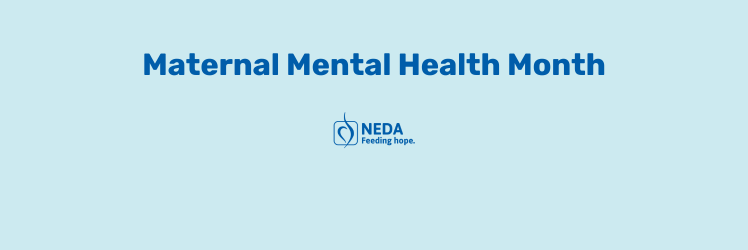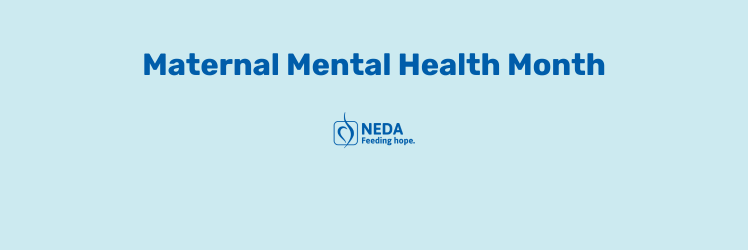This blog post represents the author’s views and should not be interpreted as professional/medical advice or endorsed by NEDA.
How do mothers with eating disorders navigate seeking treatment and recovery in a culture that can shame mothers with mental illness and praise an “ideal,” selfless mother? In my experience, it is not easy.
While every experience is different, my early days of motherhood were blissful, warm, and bright. After struggling with infertility and conceiving my son through IVF treatment, I loved every minute of time with my baby–even late night crying and blowout diapers.

Recognizing The Signs of Eating Disorder Behaviors
Engaging in eating disorder behavior was the furthest thing from my mind, and as a single parent I knew that my infant depended on me to be healthy for him. However, when I returned to my university as a PhD student seven weeks later, I began to struggle.
I did not initially recognize that I was engaging in eating disorder behavior because my life was so different compared to other times I had relapsed. I became constantly nauseous from academic stress, I got little sleep, and I seemed to be unable to find the time to eat. I was becoming depressed, feeling as if I was not a good enough parent despite my son thriving.
The Importance of Reaching Out For Help
Eventually, out of concern for my son and for a desire to feel better myself, I reached out for help with a physician who specializes in eating disorders when my son was six months old. The treatment that I received from this physician was inconsistent, forceful, and cruel. This treatment did not recognize my needs as a mother or my autonomy as an individual. However, this article is going to focus on the treatment I’ve received that has been empathetic, ethical, practical, and kind.
It is important that pregnant and postpartum mothers struggling with an eating disorder seek help. No one should have to go through it alone. Not only is treatment important for the health and wellbeing of her infant, it is important for a person as an individual, even outside of her role as a mother.

Finding Treatment That Reduces Shame and Empowers Recovery
After switching physicians and getting a new treatment team, these are the things they did that helped reduce feelings of shame and increased feelings of empowerment surrounding my recovery:
- Treating the mother as an individual, while acknowledging her role as a mother. Lying in weight: the hidden epidemic of eating disorders in adult women by Trisha Gura explains that while forced intervention for the sake of a developing child may yield immediate nutritional improvement, this can be traumatic and does not routinely have positive outcomes for mother and child long term. Explain the risks of her illness, but recognize her autonomy and present options for recovery that could reduce harm without feeling overwhelming or forceful.
- Do not present recovery or illness as a measure of how much a mother with an eating disorder loves her child and do not assign morality to illness and motherhood. My first physician asked “is your baby worth it?” I remember thinking “of course he is worth it, that’s why I’m here asking for help.” How much my child matters to me is not impacted or influenced by my illness or its severity. I love my son immensely, and I would “choose” to be healthy for him if it was simply that easy. My initial eating disorder clinician did not acknowledge the healthy bond between me and my child, nor did she recognize my individual needs, wishes, or values. Treatment became reduced to “eat for your baby” and this resulted in immense feelings of shame and self-hatred when I couldn’t.
- Understand that there are many different factors that influence how patients utilize healthcare services. Pregnant or postpartum mothers can face barriers to treatment that others do not. This can look like a lack of additional or affordable childcare, inability to take time off from work in conjunction with dismal maternity leave, and a lack of finances for treatment as she possibly now pays for childcare, diapers, formula, and other baby supplies. It is not as easy for her to “go to a higher level of care” as it may have been for her pre-pregnancy when such barriers are factored into clinical recommendations.
- Acknowledge her experience as a mother, whether that be struggling with the mental and physical demands of night feeds or the joy of watching her baby roll over for the first time. New mothers need to feel supported and develop a trusting relationship with clinicians. When my son was two, I required a short medical stabilization stay in a local hospital for a few days. My physician acknowledged the medical necessity for admission, but also acknowledged how scared I was and how being away from my child was upsetting. Speaking with the doctors and nurses in the hospital about my son in a cheerful way, such as sharing anecdotes about his favorite toys, helped me connect the difficult actions of recovery to my son in a positive way instead of a threatening one.
Eating Disorders Are Not A Choice
Eating disorders are devastating illnesses that cause immense suffering for individuals who struggle with them. These disorders are not a choice, and a woman struggling with an eating disorder during or after pregnancy is not “choosing” to struggle with the disease.
It is not an issue of whether or not she loves her baby “enough” or if the baby is “worth it,” it is a debilitating disease that deserves comprehensive and compassionate care. Pregnant and postpartum women with eating disorders should know they aren’t alone, they haven’t “failed” at motherhood, and that adequate and nurturing support is available.
Finding Confidence and Health in Motherhood and Recovery
Working with an outpatient team who supports my nutritional, emotional, and physical needs, whether that be increasing weekly appointments or coordinating medical stabilization, has made all the difference in my confidence and health regarding motherhood and recovery. While there are times that I may struggle with my eating disorder more than others, having a team that understands my needs as an individual and my autonomy as a mother has allowed me to fully trust them and find more joy and connection to parenting.
I wholeheartedly believe that I am safe and therefore my son is safe. Both of us have been nurtured by treatment professionals who support my health and wellbeing. As I devote my academic career to researching the communication and treatment of eating disorders, I strive to help create such an environment for all mothers who find themselves struggling.

My Hope for Mothers With Eating Disorders
It is my hope that women struggling with eating disorders during or after pregnancy know they have informed and compassionate providers to turn to for support, guidance, and treatment. It is imperative for the health of these women and their children that this support exists and can be available to them.
Resources
Are you concerned you might be struggling with an eating disorder? Take our confidential screening tool.
Are you looking for an eating disorder treatment provider? Find treatment in your area or online.
Are financial barriers preventing you from seeking the support you need? Learn more about free and low cost support options to connect with others and provide tools to promote recovery.
Rachel Patterson is a doctoral candidate in the Bellisario College of Communications at Penn State. Her work focuses on the intersection of public health, eating disorders, feminism, and mass media and communication. Originally from Tennessee, she currently lives in Pennsylvania with her two year old son and cats. When not focused on research or parenting, she enjoys exploring the mountains that Pennsylvania has to offer and a good trashy tv show.





